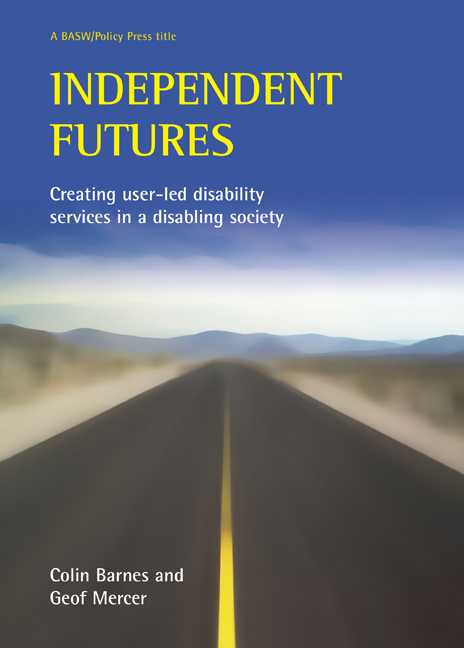Book contents
- Frontmatter
- Contents
- List of figures and tables
- Acknowledgements
- Notes on the authors
- one Examining user-led services
- two Traditional approaches: disability policy and the welfare state
- three Disability activism and the struggle for independent living
- four Researching user-led organisations
- five User-led organisations: building an alternative approach
- six Service design and delivery: opportunities and constraints
- seven Service users’ views and experiences
- eight Politics and campaigning
- nine Policy change or retrenchment?
- ten Future directions
- References
- Index
nine - Policy change or retrenchment?
Published online by Cambridge University Press: 15 January 2022
- Frontmatter
- Contents
- List of figures and tables
- Acknowledgements
- Notes on the authors
- one Examining user-led services
- two Traditional approaches: disability policy and the welfare state
- three Disability activism and the struggle for independent living
- four Researching user-led organisations
- five User-led organisations: building an alternative approach
- six Service design and delivery: opportunities and constraints
- seven Service users’ views and experiences
- eight Politics and campaigning
- nine Policy change or retrenchment?
- ten Future directions
- References
- Index
Summary
Introduction
We now draw together the main themes raised in previous chapters concerning the implementation of a social model approach to service provision for disabled people. Attention centres on the practical implications of developing user-controlled services.
Throughout its history the Disabled People's Movement has campaigned for recognition of the right of disabled people not to be forced into routine and significant dependence on non-disabled people. The political goal has been a society that facilitates and supports an independent lifestyle. In this struggle, user-controlled organisations have been accorded a crucial role.
The discussion in this chapter will concentrate on three main areas: first, the links between user-led organisations and traditional statutory and voluntary sector service providers, and how far and in what ways possibilities are being exploited for services supportive of independent living and social inclusion. A second section reviews attempts to counter the entrenched dominance of professionals in disabled people's lives, and the potential for alternative ways of delivering services. One such suggestion has been to create a new ‘profession allied to the community’, with practitioners adhering to a social model approach. A further possibility, strongly promoted by New Labour, is the development of meaningful partnerships between key stakeholders and service providers and disabled people's organisations. Finally, we review recent New Labour proposals for a significant shift in health and ‘social care’ policy that accords a major role to independent living-type support services, including user-controlled organisations.
Dependence, independence or inclusion?
As human beings:
We rely on each other in a multitude of ways from the provision of the essentials of food, water and shelter to the complexities of feelings of self esteem. (Parker, 1993, p 11)
However, such interdependence is widely overshadowed in Western industrial societies by the idea that individuals should be self-sufficient or independent. This notion gained considerable impetus during the social and intellectual upheavals of the late 18th and early 19th centuries. Yet, there has been a resurgence of such thinking in the final quarter of the 20th century associated with a neo-liberal ideology that identified the rising costs of state welfare systems and their negative impact on self-help, individualism and entrepreneurial initiative as a major threat to economic growth and success. This has had an evident impact on both New Right and New Labour government policies,
Although the Disabled People's Movement has tried hard to develop user-controlled services that are separate from orthodox professionally led provision, findings from the Creating Independent Futures project show that this has been a very uneven struggle.
- Type
- Chapter
- Information
- Independent FuturesCreating User-Led Disability Services in a Disabling Society, pp. 159 - 180Publisher: Bristol University PressPrint publication year: 2006



